Roy Miller's Blog, page 300
January 14, 2017
The Unbearable Niceness of Being
The first feeling to arrive while reading Emily Gould’s essay on publishing’s gendered niceness problem was mortified panic. It was followed my many more feelings, but the mortified panic lingered throughout, accompanying other fears made more real by seeing them confirmed in writing by another woman my age in the same industry. I bristled at some points and nodded my head with the entire top half of my body at others, but the one that nagged at me most wasn’t found in the essay itself but in its sub-hed: “Baking cookies is just part of playing the game.” Amid Gould’s thorough and thoughtful critique of the expectations placed on women in publishing, I was stuck on the thought that I had missed the memo on bringing cookies to my readings to render myself more likable than my prose and wit could do alone. As I read on, however, I discovered a still greater horror: even in the absence of snacks, I still exhibit the telltale characteristics of someone who is nice.
By the time I finish writing this, I will have typed and deleted and retyped more cautiously every sentence of this essay. This is because I largely agree with Gould’s conclusions about the unfairly high expectations for women in publishing and don’t want to misrepresent myself as oppositional to them, but if I am honest with myself, it is also because I want to be nice. I do not mean that I want people reading this to think I’m nice, but that I want to actually be nice. And no, I do not mean kind or empathetic or warm in this case. I strive to be all of those things too, but I really do just mean nice here. I keep italicizing that word because it has come to read as a hissed accusation of shallow ingratiation more often than as a simple description of agreeability. But that’s what I want to be. You know, pleasant. The kind of person who compliments perfectly satisfactory but not especially exciting outfits, who staves off lulls in party conversations by asking more questions about a topic that is nearly boring them to tears. I don’t just smile when I meet new people at readings or industry parties; my smile has an exclamation point in it.
Gould refers to the niceness that women in publishing are expected to perform as “playing the game.” Among other niceties, the game is said explicitly to involve writing fawning social media posts about “okay-ish” books and sending friendly notes to critics along with galleys. I read Gould’s essay last Friday, the day that galleys for my first book were shipped and the day after my publicist at Grand Central sent me an Excel sheet of the names of people receiving them. I had spent hours crafting personalized emails to several of the recipients, telling them I was excited they were getting the book, detailing why I thought they specifically would like it, even recommending particular essays based on their reading and writing habits. Now, I felt a rush of panic that these recipients would think me a brown-nosing try-hard like Tracy Flick—her will to power fueled by chirpy interjections and smiles—or worse, a serpentine manipulator like Regina George, complimenting an outfit one moment and calling it the fugliest f-ing thing she’s ever seen the next.
I use girls from teen movies as examples intentionally here because my experience in publishing has felt so often not like a real high school experience, but like some exaggerated fable about the pitfalls of gossip, caring too much about public perception, and seeking popularity at the expense of integrity. Gould chronicles the exhausting dance of being complimentary to all editors and their authors for fear that they may one day edit us; the unfulfillable desire to ignore publicists because they might eventually become our own; the withholding of “a savage pan,” trapped by possibility of being thrust onto a panel with or under the awards judgment of the author in question. “After all, the business of publishing is not about being nice, it’s about seeming nice, and no one is really that nice,” she concludes.
Article continues after advertisement
Gould has spent far longer in publishing than I have and been treated far more cruelly when she did not capitulate to the demands for female likability, so it is reasonable that she sees these demands as especially exhausting. I understand feeling disturbed that so much of this niceness is a veneer. But I am reticent to embrace an alternative where icy ambivalence or willful disinterest in others is the norm. Though men within publishing frequently exempt themselves from efforts at likability among their peers, nearly everyone in the industry exempts themselves from these efforts when it comes to outsiders. Gould comments on the welcome reprieve of witnessing an especially disengaged woman author at an industry event, but people seeking to get into the industry have likely met some version of that woman several times over. The resulting insecurity and sense of unwelcome among writers without access to publishing’s inner circle is disheartening for an industry that ought to be working tirelessly to be more inclusive, and it is men who have recused themselves from niceness who should be doing more of the heavy lifting.
I diverge somewhat from Gould’s account in my belief that nice is not something that you are; it is something that you do. So much emphasis is placed on intention that we neglect to see the often positive outcomes of even niceness that comes without pure intentions. When I wrote those notes to the people receiving my galleys, the impetuses really were the giddy excitement of sharing my work with peers and a belief that it would be odd not to mention it was coming. I wouldn’t weave a basket and have it sent to a colleague who likes textile crafts without explaining it; why would I do so with a book? But there have been plenty of other occasions where producing that niceness took extraordinary will power. Every day, I awaken to a fresh battle against my own swiftness to judge, my petty jealousy, a viciousness I’m occasionally impressed by but would mostly prefer to temper.
I corresponded with Gould for this piece, and she was clear that her intention was not to valorize un-niceness, but to argue that these expectations put an uneven burden on women to be likable. She said that one of the reasons she started Emily Books was because she is fairly naturally inclined to socializing, being engaged with others, and listening, and she wanted to relieve writers of that burden. Gould told me that barring a few exceptions, “writers are terrible salespeople and spokespeople, and those things shouldn’t be in the job description.”
I fear that this gives writers both too much and too little credit at once. The idea that writers are good at writing and little else perpetuates a mythology that we are special creatures whose agility with language renders us more deeply attuned to the human condition than others and therefore exempt from doing the bare minimum: answering questions in full sentences at industry events and talking about our work when we are, indeed, at work. It is the decency of returned emails and speaking to your tablemates at a party thrown to honor you. Such decency is demanded in every other profession on Earth besides being a Real Housewife or playing in the NHL, and I don’t think that just because the men in our industry eschew this in favor of offensive levels of self-regard makes it courageous or authentic in women. This decency need not be the over-indulgence of cookies or new friendships on demand, but a manifestation of that thing we are allegedly so good at: seeing the human condition and responding to it with just enough tenderness to connect but not attach.
Publishing is also an industry that selectively values a kind of swaggering authenticity that would never capitulate to demands for something so banal as being nice. But authenticity is too often a short hand for callous, aloof, or honest for the purpose of cruelty rather than truth-seeking. This version of authenticity is highly regarded primarily in white male writers, who range from moderately readable to exceptional, and in the occasional woman writer who is usually exceedingly beautiful and whom men have deigned to read and enjoy. Almost without exception, these writers are also white. “Most everyone, except conscientious objectors, the very un-astute, and people with unshakable confidence or inherited wealth, plays the game,” Gould writes, adding that these categories are almost the exclusive purview of men. I look at these categories and find nothing to envy. Of all the things to conscientiously object to, making people feel visible and valuable just doesn’t rank very highly! No confidence should be unshakeable! And if you have enough inherited wealth to make un-niceness a possibility, you are not so much a writer as a tourist in a very high-risk, low-reward immersion program.
Like Gould, I have also been called upon to spend hours engaging with readers who come far too close for comfort, have been made to “feel like the marrow is being sucked out of my bones” in the aftermath. Women in this industry should not feel duty-bound to befriend every reader who lands in our inbox or to go the extra mile for publicists we don’t know every time they ask. But I do think that writers, if they choose not to be anonymous, can and should acknowledge the labor of their colleagues who make their work possible and the readers who make their work at least potentially profitable.
It is men who should admire and emulate women’s example of listening and engaging within reason in professional contexts. When complaining of the indifference or callousness of male writers, I have often heard the defense, “He actually has a really good heart,” or, “Deep down, he’s a good guy.” But how good can someone’s goodness really be if it dwells only in their interiors, the realm of intentions rather than actions? A sweet heart is not especially useful if it is paired with a bitter tongue. It is high time we demanded that men in publishing remedy this. They can start by making the next batch of cookies.
The post The Unbearable Niceness of Being appeared first on Art of Conversation.
January 13, 2017
Milo Yiannopoulos and the Slippery Slope of Free Speech
Free speech is a right we all have as Americans. However, as the Supreme Court has ruled, free speech has its limits. You can’t yell “fire” in a crowded theater when there is no fire.
On the other hand, there are no boundaries on inflammatory copy in books. The Supreme Court has ruled that it is allowable under the First Amendment to explain how to build a bomb or murder another human being. According to the same doctrine, books are permitted to promote racism, anti-Semitism, sexism, and false information with complete impunity.
So exactly what is the responsibility of a legitimate book publisher—that is, a company that spends its own money on acquiring, editing, marketing, and selling its titles? I have been asking myself this ever since I read the story about Simon & Schuster giving Breitbart staffer Milo Yiannopoulos $250,000 as an advance for his book on “free speech.”
I’m sure that the social-media-savvy editor at S&S who shepherded the deal recognized the many financial and public relations benefits of signing up a controversial writer with a large online following. Hell, who wouldn’t want to sign the Justin Bieber of the alt-right? Perhaps what was missing in all the excitement was the notion of responsibility—the very thing on which Richard Simon and Max Schuster built their company.
A few years back, I was invited to participate in a debate titled “Are Publishers Relevant?” The goal was to question whether self-publishing had made commercial houses unnecessary. My side was to argue the merits of writers working with an established publishing company rather than on their own.
When the debate ended, participants fielded questions from the audience. One of the questions was, “As a publisher, aren’t you a gatekeeper who chooses only the books you want?” I hadn’t thought of it in those terms, but the answer is, yes, that is exactly what publishers are. We use our best judgment to select titles that fit our companies’ editorial profiles.
“Well, isn’t that a form of censorship?” asked another audience member. Certainly, that is one way of looking at it, but as publishers, we do have to sort out the good from the bad. And that determination reflects who we are as businesspeople as well as human beings.
As an independent publisher who produces health books, I can take chances on unagented projects written by first-time authors. If the information presented in these manuscripts flies in the face of traditional medicine, I will still publish the titles as long as they have the science behind them. But I also have a responsibility to produce books that do no harm. For doctors, it’s part of their Hippocratic oath, but publishers must rely on our consciences to make our decisions.
Yet over the past several decades, the desire to attract attention and make a quick buck has increasingly overtaken conscience. Years ago, I stood in line at a supermarket looking at the bizarre tabloid headlines: “I Married an Alien,” “Marilyn Monroe’s Love Child Found!” Ridiculous, I thought, but obviously someone was buying these papers. More recently, the same “I can say anything as long as I get your attention” behavior found its way into our nation’s presidential race.
We now have a major publishing house paying an author who has a history of writing hate-based articles and using social media in the same way that supermarket tabloids use sensational headlines. And ironically, the author wishes to write a book about his constitutional right to spew intolerance under the guise of free speech. Should the book find its market, it is likely to open the door to hundreds of similar profit-making titles. And what’s wrong with that?
If we, as publishers, cannot tell the difference between good and evil, between conscience and profit, between extremist views and the views our founding fathers put forth, we are no better than those tabloids. What would Simon or Schuster think of the fact that their namesake house is playing a major role in legitimizing such an author?
Rudy Shur is the publisher of Square One.
A version of this article appeared in the 01/16/2017 issue of Publishers Weekly under the headline: The Slippery Slope of Free Speech
The post Milo Yiannopoulos and the Slippery Slope of Free Speech appeared first on Art of Conversation.
November Bookstore Sales Rose 1.5%
Bookstore sales inched up 1.5% in November over November 2015, according to preliminary estimates released Friday morning by the U.S. Census Bureau. November's sales were $805 million, up from $793 million a year ago.
The increase followed a decline in sales in October which a number of booksellers had attributed to distractions caused by the presidential election and many booksellers and publishers were hoping for a post-election sales bump. While not a huge increase, the 1.5% rise in bookstore sales got the trend heading in the right direction.
For the first 11 months of 2016, bookstore sales were $10.58 billion, an increase of 3.4% over the same period in 2015.
For the entire retail sector, November sales rose 5.2% and sales for the year to date increased 3.1%.
The post November Bookstore Sales Rose 1.5% appeared first on Art of Conversation.
21 Literary Agents Seeking Young Adult Contemporary Fiction NOW
[Intro text will go here.]
1. Lauren Spieller (Triada US Literary Agency)
Notes: No specific notes given.
How to Submit: Send queries to lauren [at] triadaus.com, and take a look at the agency’s full submission guidelines.
 2. Michelle Brower (Aevitas Creative Management)
2. Michelle Brower (Aevitas Creative Management)
Notes: No specific notes given.
How to Submit: Aevitas Creative Management is a full service literary agency formed from the recent merger of Kuhn Projects and Zachary Shuster Harmsworth. Please check the Aevitas website for updated submission guidelines.
 3. Molly O’Neill (Waxman Leavell Literary Agency)
3. Molly O’Neill (Waxman Leavell Literary Agency)
Notes: No specific notes given.
How to Submit: Send queries to mollysubmit [at] waxmanleavell.com, and take a look at the agency’s full submission guidelines.
 4. Emily Forland (Brandt & Hochman)
4. Emily Forland (Brandt & Hochman)
Notes: No specific notes given.
How to Submit: Send queries to eforland [at] bromasite.com, and take a look at the agency’s full submission guidelines.
 5. Katie Grimm (Don Congdon Associates)
5. Katie Grimm (Don Congdon Associates)
Notes: No specific notes given.
How to Submit: Take a look at the agency’s full submission guidelines.
 6. Renee Nyen (KT Literary)
6. Renee Nyen (KT Literary)
Notes: No specific notes given.
How to Submit: Send queries to __________ [at] _________, and take a look at the agency’s full submission guidelines. CHECK BACK–WEBSITE IS DOWN.
 7. Patricia Nelson (Marsal Lyon Literary Agency)
7. Patricia Nelson (Marsal Lyon Literary Agency)
Notes: No specific notes given.
How to Submit: Take a look at the agency’s full submission guidelines.
 8. Victoria Selvaggio (Jennifer De Chiara Literary Agent Agency)
8. Victoria Selvaggio (Jennifer De Chiara Literary Agent Agency)
Notes: No specific notes given.
How to Submit: Send queries to vselvaggio [at] windstream.net, and take a look at Victoria’s full submission guidelines.
 9. John Rudolph (Dystel, Goderich & Bourret LLC)
9. John Rudolph (Dystel, Goderich & Bourret LLC)
Notes: No specific notes given.
How to Submit: Take a look at the agency’s full submission guidelines.
 10. Jennifer De Chiara (Jennifer De Chiara Agency)
10. Jennifer De Chiara (Jennifer De Chiara Agency)
Notes: No specific notes given.
How to Submit: Send queries to jenndec [at] aol.com, and take a look at the Jennifer’s full submission guidelines.
 11. Steve Kasdin (Curtis Brown, Ltd.)
11. Steve Kasdin (Curtis Brown, Ltd.)
Notes: No specific notes given.
How to Submit: Send queries to skasdin [at] cbltd.com, and take a look at the agency’s full submission guidelines.
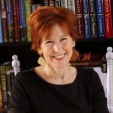 12. Jennifer Flannery (Flannery Literary)
12. Jennifer Flannery (Flannery Literary)
Notes: No specific notes given.
How to Submit: Send queries to jennifer [at] flanneryliterary.com, and take a look at the agency’s full submission guidelines.
 13. Wendi Gu (Greenburger Associates)
13. Wendi Gu (Greenburger Associates)
Notes: No specific notes given.
How to Submit: Send queries to wgu [at] sjga.com, and take a look at the agency’s full submission guidelines.
 14. Emily Van Beek (Folio Jr.)
14. Emily Van Beek (Folio Jr.)
Notes: No specific notes given.
How to Submit: Send queries to emily [at] foliolitmanagement.com and take a look at the agency’s full submission guidelines.
 15. Jill Corcoran (Jill Corcoran Literary Agency)
15. Jill Corcoran (Jill Corcoran Literary Agency)
Notes: No specific notes given.
How to Submit: Send queries to jill [at] jillcorcoranliteraryagency.com, and take a look at the agency’s full submission guidelines.
 16. Christa Heschke (McIntosh & Otis)
16. Christa Heschke (McIntosh & Otis)
Notes: No specific notes given.
How to Submit: Send queries to chquery [at] macintoshandotis.com, and take a look at the agency’s full submission guidelines.
 17. Peter Knapp (Park Literary & Media)
17. Peter Knapp (Park Literary & Media)
Notes: No specific notes given.
How to Submit: Send queries to queries [at] parkliterary.com, and take a look at the agency’s full submission guidelines.
 18. Cindy Uh (Thompson Literary Agency)
18. Cindy Uh (Thompson Literary Agency)
Notes: No specific notes given.
How to Submit: Send queries to submissions [at] thompsonliterary.com, and take a look at the agency’s full submission guidelines.

19. Danielle Burby (HSG Agency)
Notes: No specific notes given.
How to Submit: Take a look at the agency’s full submission guidelines.
 20. Bibi Lewis (Ethan Ellenberg Literary Agency)
20. Bibi Lewis (Ethan Ellenberg Literary Agency)
Notes: No specific notes given.
How to Submit: Send queries to agent [at] ethanellenberg.com, and take a look at the agency’s full submission guidelines.
 21. Bill Contardi (Brandt & Hochman Literary Agents, Inc.)
21. Bill Contardi (Brandt & Hochman Literary Agents, Inc.)
Notes: No specific notes given.
How to Submit: Send queries to bill [at] billcontardi.com, and take a look at the agency’s full submission guidelines.
 22. Quressa Robinson (D4EO Literary Agency)
22. Quressa Robinson (D4EO Literary Agency)
Notes: No specific notes given.
How to Submit: Send queries to quressa [at] d4eo.com, and take a look at Quressa’s full submission guidelines.
 23. Hannah Fergesen (KT Literary)
23. Hannah Fergesen (KT Literary)
Notes: No specific notes given.
How to Submit: Take a look at the agency’s full submission guidelines.
You might also like:
The post 21 Literary Agents Seeking Young Adult Contemporary Fiction NOW appeared first on Art of Conversation.
LitHub Daily: January 13, 2017
The Best of the Literary Internet, Every Day
TODAY: In 1941, James Joyce dies.
On accidentally naming after a real person. Who then emails you. | Literary Hub
Alana Massey on the myth of the antisocial writer, and the fear of being nice. | Literary Hub
In honor of Friday the 13th, a brief survey of great literary obituaries. | Literary Hub
A photographic journey along the Underground Railroad. | Literary Hub
“I do believe that while a picture may paint a thousand words, a thousand considered words are more powerful than a thousand misleading pictures.” Eimear McBride on representations of women’s sexuality in our culture and literature. | Times Literary Supplement
On The Art of the Affair and uncovering the relationships between the (apparently, much more fun) artists of the past. | VICE
“It’s pleasurable to read and write about confusion because that’s what we do as people. We are often confused.” An interview with Lynne Tillman. | The Creative Independent
She was a diamond partly because her company was so rough: On Megyn Kelly’s memoir. | The New Yorker
On the latest iteration of Sherlock and the use of detective fiction “in a world gone berserk.” | New Republic
“I wanted to explore how we’ve ended up so disastrously disconnected from the suffering we are imposing on the living world.” An interview with Thalia Field (who will read next week at a benefit for the Nonhuman Rights Project and NRDC). | Nonhuman Rights Project, Solid Objects
Announcing the shortlist for and the judges of the . | The Morning News

The post LitHub Daily: January 13, 2017 appeared first on Art of Conversation.
Kareem Abdul-Jabbar Remembers Muhammad Ali
During my more than 50 years in the public eye, I have met hundreds of renowned celebrities, artists, athletes, and world leaders. But only a handful embodied the self-sacrificing and heroic qualities that defined my friend and mentor Muhammad Ali.
A master of self-promotion, Ali declared early in his boxing career, “I am the greatest!” This kind of boasting enraged many people, just as he’d hoped, ensuring there was a large audience that just wanted to see this upstart boy taught a lesson. But it was Ali who taught the lesson, because, as he once said, “It’s not bragging if you can back it up.” And back it up he did. Again and again. And not just in the ring.
Part of Ali’s greatness was his ability to be different things to different people. To sports fans he was an unparalleled champion of the world, faster and smarter than any heavyweight before. To athletes, he was a model of physical perfection and shrewd business acumen. To the antiestablishment youth of the 1960s, he was a defiant voice against the Vietnam War and the draft. To the Muslim community, he was a pious pioneer testing America’s purported religious tolerance. To the African-American community, he was a black man who faced overwhelming bigotry the way he faced every opponent in the ring: fearlessly. At a time when blacks who spoke up about injustice were labeled uppity and often arrested under one pretext or another, Ali willingly sacrificed the best years of his career to stand tall and fight for what he believed was right. In doing so, he made all Americans, black and white, stand taller. I may be 7’2”, but I never felt taller than when standing in his shadow.
The secret to Ali’s power and impact as a performer is the sly sophistication of his approach. He adopted the persona of the Shakespearean court jester, whose role in the bard’s plays wasn’t just to entertain the court with his foolishness but to infuse his antics with insights of truth about them. The jester’s witty repartee made those bitter truths easier to swallow—and kept the royals from cutting off his head for his impudence.
In the end, Ali was not able to hide his outrage at injustice behind his entertaining disguise, and they did indeed come for his head. His conversion to the Nation of Islam in 1964 resulted in him being stripped of his heavyweight champion title. His refusal to submit to the draft during the Vietnam War on the grounds that “my conscience won’t let me go shoot my brother, or some darker people” caused him to be sentenced to five years in prison, fined $10,000, and banned from boxing for three years, his license to box being revoked in all states. He didn’t fight for three years during his physical prime, when he could have earned millions of dollars, because he stood up for a principle. While I admired the athlete of action, it was the man of principle who was truly my role model. (In 1971, Ali’s conviction was overturned by the U.S. Supreme Court in an 8–0 decision; Justice Marshall disqualified himself because he was solicitor general when the government brought its case against Ali.)
The golden rule of business is to figure out what the public wants and give it to them. With the rise of the civil rights movement causing so much social turmoil and unrest, Ali figured out that what white America wanted was things to go back to the way they were: voices crying out for equality silenced; blacks quietly waiting for whites to decide if and when to give them the gift of equality. Ali represented that upstart voice, and defeating him would send a message to other blacks speaking out.
Well, Ali outfoxed them all. They didn’t defeat him, and their efforts only inspired others—black and white—to fight for equality. Not just racial equality but gender, sexual, and religious equality. He never stopped being the entertainer, quick to launch a witty barb or make your keys disappear. But the message beneath it all was said with a grin on the lips, and with steel in the eyes: “I am America. I am the part you won’t recognize. But get used to me. Black, confident, cocky, my name not yours. My religion not yours. My goals my own; get used to me.”
Most young people today know Ali only as the hunched old man whose body shook ceaselessly from Parkinson’s Disease. But I, and millions of other Americans black and white, remember him as the man whose mind and body once shook the world. And the world has been better off because of it.
Kareem Abdul-Jabbar is a bestselling author and columnist, and the NBA all-time leading scorer. His latest book, Writings on the Wall: Searching for a New Equality Beyond Black and White, will be published by Time Inc. Books in August.
A version of this article appeared in the 06/27/2016 issue of Publishers Weekly under the headline: Ali and Me
The post Kareem Abdul-Jabbar Remembers Muhammad Ali appeared first on Art of Conversation.
5 Books on Media and Government
By Derek B. Miller
|
Derek B. Miller's new novel, The Girl in Green, is a powerful commentary on the effects of war. It's a stirring depiction of the complicated Iraq-Syria situation, especially the desperate plight of refugees and the West’s failure to provide peace or relief. Miller, who is a veteran international affairs specialist, picks five books on the complex relationship between media and government.
On 15 April, 2013, two terrorists set off two bombs near the finish line of the Boston Marathon. I'm from the Boston area, have moved away, and return every year to see friends and family. The last time I visited Boylston Street I stood on the spot of the first explosion near Copley Square. This is across from the Boston Public Library. I've read many accounts of that day, and seen a great deal of news coverage. What I've never seen mentioned is what it says across the street—in the bomber's sight—on the frieze of America's oldest public library:
THE COMMONWEALTH REQUIRES THE EDUCATION OF THE PEOPLE AS THE SAFEGUARD OF ORDER AND LIBERTY. FREE TO ALL.
These words are carved in stone.
They are, to me, the lodestar we must follow to free ourselves from the approaching darkness of superstition, ignorance, willful denial of facts, and the crumbling of our republic as a consequence.
So listen up:
Like our library system, and our education system, the media is an instrument of education on which our capacity for self-government depends. It is now conventional wisdom, however, that there is a crisis of confidence within journalism, that the news media is conceptually and financially flailing because they cannot figure out how to turn authoritative news into enough profit to sustain the activity. And underneath the business of news are the existential questions that post-modernism has not only called into question but has fundamentally undermined: Is there really "truth?" What is a "fact?" Do truth and facts exist separate from interpretation, and if not, aren't we all biased? And if so, whose news should count as authoritative? And so on.
This is now the quagmire in which Western civilization—America, perhaps, especially—finds itself. Step one in getting out of this morass is for us all to learn how to face facts again. Below are five books you've probably never heard of. They are not current, and none talk about social media, fake news, Twitter, Facebook live streaming, or what we mistakenly think of as our totally unprecedented situation. Instead, they are a Citizen's Survival Guide for getting our bearings in the maelstrom around us with ideas, arguments, history, and conceptual clarity that can help us make sense of what's around us, and serve as building blocks in making reasoned cases for progress. In no order:
1. Just the Facts: How "Objectivity" Came to Define American Journalism by David T.Z. Mindich (Revised edition, 2000)
This is a very approachable but authoritative biography of "objectivity" that explains how and why we value that notion and, by extension, why we feel so betrayed when objectivity is lost. Knowing this helps us see the arch and return to the topics that really matter, while fending off false claims we hear every day. Not bad for one book.
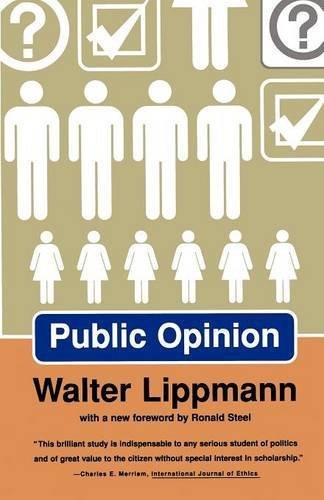
2. Public Opinion by Walter Lippmann (1922)
Published shortly after the end of World War I, you might think it's totally dated. It's not. Lippmann ties three vital strands of American life together and gives us a way to understand their relationship: The press (which we now call the Media), government, and public opinion. A great deal of scholarship has taken place since then on these topics, and it's too much for the non-specialist to wade through. But a few days with this will give you a bedrock for approaching almost every argument you now hear and will give you insight into what matters most.
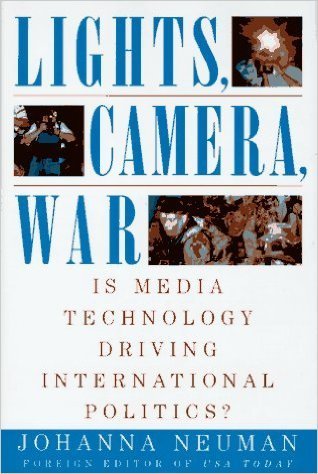
3. Lights, Camera, War: Is Media Technology Driving International Politics? by Johanna Neuman (1996)
Neuman was a White House correspondent, and twenty years ago she rightly wondered about who is leading whom in politics—if it's the media or the government. With Trump coming to power and what is likely to be an assault on free speech, free freedom, and media access (by controlling access to the White House, using favoritism as a carrot and threats as a stick, at the very least), Neuman helps us—like Mindich—see the big picture. Neuman helps us remember that all the discussions about "time and space shrinking" because of social media are almost exactly the conversations we had about the telegraph. We need this perspective, otherwise we'll ignore voices and ideas from the pre-Internet era at our peril.
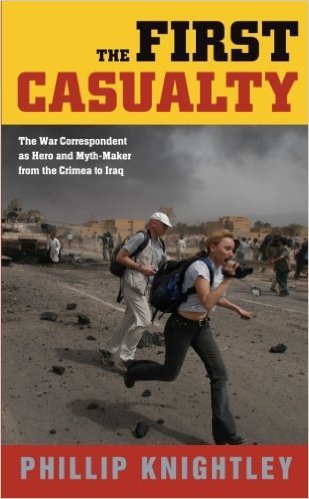
4. The First Casualty: The War Correspondent as Hero and Myth-Maker from the Crimea to Iraq by Phillip Knightley (1975 with a new edition from 2004)
Want to start speaking sensibly about media bias and get past the head-banging discussion of the "liberal media" and who is more biased than whom? Read this and remember: "The first casualty, when war comes, is truth," said American Senator Hiram Johnson in 1917. Keeping an eye on the next administration means understanding this, because war is and will be used to distract us from what really matters. Trump uses Twitter for this now. Imagine when he can use war itself.
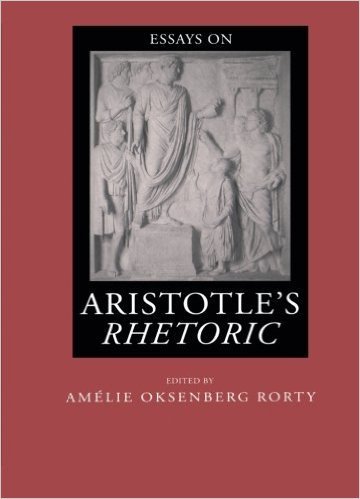
5. Essays on Aristotle's Rhetoric edited by Amélie Oksenberg Rorty (1996)
I know what you're thinking: "Dude… seriously?" But here's the thing: We live in a time when belief and argument are at the pulsing center of our civic life. Reading Aristotle without a guide is hard. This has been my guide and can be yours. These essays discuss emotion, and persuasion, the role of composition in influence, and whether the truth can prevail against a lie if told with equal eloquence. Don't read through it. Pull it from the shelf, sharpen your blade, and then return to the battle for the soul of American democracy.
The post 5 Books on Media and Government appeared first on Art of Conversation.
Your Story #80: Submit Now!
Prompt: Write the opening sentence (just one sentence), of 25 words or fewer, to a story based on the photo to the left.You can be funny, poignant, witty, etc.; it is, after all, your story.
Use the submission form below OR email your submission directly to yourstorycontest@fwmedia.com.
IMPORTANT: If you experience trouble with the submission form, please email your submission directly to yourstorycontest@fwmedia.com within the body of your email (no attachments, please).
Unfortunately, we cannot respond to every entry we receive, due to volume. No confirmation emails will be sent out to confirm receipt of submission. But be assured all submissions received before entry deadline are considered carefully. Official Rules
Entry Deadline: February 20, 2017
Your Story Entry Form
You might also like:
CATEGORIES
Your Story Competition
The post Your Story #80: Submit Now! appeared first on Art of Conversation.
January 12, 2017
W.S. Merwin: On Reading What You Want, Reading It Slowly, and the Beauty of Trees
W.S. Merwin and Paul Holdengraber discuss the pleasure of literary discovery, the joys of paying attention, and much, much more.
W.S. Merwin on reading poems, not poetry…
I think you should read them one at a time and pay attention to them, not to what you ought to be doing. I think it is terrible reading poetry or anything else because you ought to. We grew up that way and we ought to have outgrown it by now, don’t you think?
W.S. Merwin on reading what you want to…
Read what you want to. If you like to read Hallmark greetings cards, then read lots of Hallmark greeting cards.
Article continues after advertisement
W.S. Merwin on when his father introduced him to literature…
He read the sixth chapter of the book of Isaiah and I was so taken by the sound of the language that I had memorized it just by hearing it. I thought, I have to find more language like that because I really want that to be part of my life.
W.S. Merwin on the pleasure and necessity of reading slowly…
Oh, yes, that’s very important. There have been other poets—really great friends of mine—that did it the same way… Sylvia Plath and her husband Ted Hughes. We used to take walks around London and they read that way.
W.S. Merwin on losing the act of reading slowly…
I expect we are. If we are, we’re losing some extremely important part of our civilization, of who we are, something that will keep itself in our lives if we let it.
W.S. Merwin on feeling that the world is new…
I think I’ve been looking for that all my life and sometimes I found it and I wasn’t ever really that far away from it. I think I’ve been very lucky. I’ve had a long and happy life not cluttered up. I’ve lived a very simple life. The house in which I’m speaking to you in is one that I designed and built myself 30 some years ago in Maui. It’s a great pleasure to be here. I think I’m extremely lucky. What that means I simply don’t know, Paul. What is luck and where does happiness come from?
W.S. Merwin on what trees can teach us…
They’re everything. They’re a kind of life that is incredibly ancient. People say why palms and I say palms are 90 million years old and we don’t know anything about them. All you have to do is just pay a little attention to them and you can be learning from them all the time. You should be feeling a great pleasure in being alive. Trees have these connections between the roots and the leaves. A drop of rain that lands on the leaf of a tree is not the same as the drop that later falls down into the ground. There’s so much about it that we don’t understand and we don’t have to understand it. It’s not about understanding. It’s about our one life, our one and only life.
W.S. Merwin on the ending of his poems…
I want them to have a feeling that they wrote themselves.
The post W.S. Merwin: On Reading What You Want, Reading It Slowly, and the Beauty of Trees appeared first on Art of Conversation.
What Does ‘Brexit’ Mean for Publishing?
The day I feared since David Cameron stepped out the door of 10 Downing Street in May 2015 to declare victory for the Conservative Party came to pass in the early hours of June 24, when news spread that voters opted to take Britain out of the European Union, of which it had been a grouchy member for more than 40 years. “No man is an island,” John Donne wrote in his Devotions upon Emergent Occasions. “If a clod be washed away by the sea, Europe is the less.”
Around the world the dominoes have fallen. Between the announcement of the results on Friday and the following Monday, $2 trillion were wiped off global stock markets. How much worse will it become? Nobody knows. It’s now clear the British government made no contingency plans, and those who led the “Leave” campaign have not the foggiest idea how to proceed.
No doubt, there are a few people in the book world who voted to leave, but I don’t know who they are. We are a broad-minded bunch, generally speaking. Books make us so. When we land in Beijing, Bologna, Frankfurt, Guadalajara, or Sharjah, we feel part of an international community. So what does “Brexit” mean for publishing?
At the most basic level, uncertainty is always bad for business. Small British publishers—always conscious of cutting their cloth—will be cautious indeed. The multinational houses that dominate the industry will be modeling various scenarios. I hear that one has already put new projects and contracts on hold. And as with the 2008 recession, some will use Brexit as an excuse to rationalize, to put out to grass older and wiser, but more expensive, heads and hire younger, cheaper staff. (How must indebted British postgraduate students feel, their futures blighted?)
On both the high street and Amazon, sales of books (and much besides) in the U.K. will slump. Brexit will mean an increase in the cost of living. Inevitably, all that means at least a short-term cut in discretionary spending, as there was in 2008. Clearly that will have impact on British booksellers and publishers; lists will be trimmed—perhaps slashed—in response.
Publisher turnover will be further imperiled by the loss of European sales. After skirmishes a few years ago, it was broadly agreed that U.K. publishers should be able to acquire exclusive English-language rights for the entire E.U. market. But with Britain out of the E.U., Europe—including Ireland—becomes an open market, a battleground where the cheapest edition wins out. Academic and educational publishers will be able to continue to seek world English rights and possibly continue to obtain a full assignment of copyright, but trade publishers will not.
Moreover, U.K. trade publishers need Europe to give them scale; after all, their U.S. counterparts already have Latin America and sometimes Canada. The realignment will reduce the income of British authors for whom Europe is currently part of the home market so far as royalties are concerned. The situation could become desperate if—or when—Scotland gains independence in order to remain in the E.U.
Then there are E.U. copyright laws, which emanate in Brussels and are broadly harmonized across the union. There is currently a move to revisit the whole E.U. copyright regime, but that won’t be a priority now: Brussels has more urgent questions with which to grapple. Ultimately, U.K. copyright law will be rewritten.
Recent years have seen increased interest in translated fiction in Britain. However, much of the money that makes translations viable (remember, most translations come from small indies) originates in Brussels. The Ariane Project, for example, was set up in 1997 to offer assistance to European publishers for translation and to encourage cross-border cooperation and partnerships, as well as training to improve “the skills of professionals working towards the knowledge and dissemination of European literature,” important in those countries where publishing is not a mature industry.
And the plus side of Brexit? In the short term, advances and royalty checks arriving in dollars and euros will be worth so much more. Authors should make hay while the sun shines, but U.K. publishers will be counting the extra cost of print and shipping.
Me, I’ve applied for the Irish passport I’ve always been entitled to on account of my one Irish grandparent.
Liz Thomson is a journalist, broadcaster, and author who has spent 30 years chronicling the international book trade. Her current project, the Village Trip, is a series of live events celebrating the history of N.Y.C.’s Greenwich Village.
A version of this article appeared in the 07/04/2016 issue of Publishers Weekly under the headline: What Does “Brexit” Mean for Publishing?
The post What Does ‘Brexit’ Mean for Publishing? appeared first on Art of Conversation.



